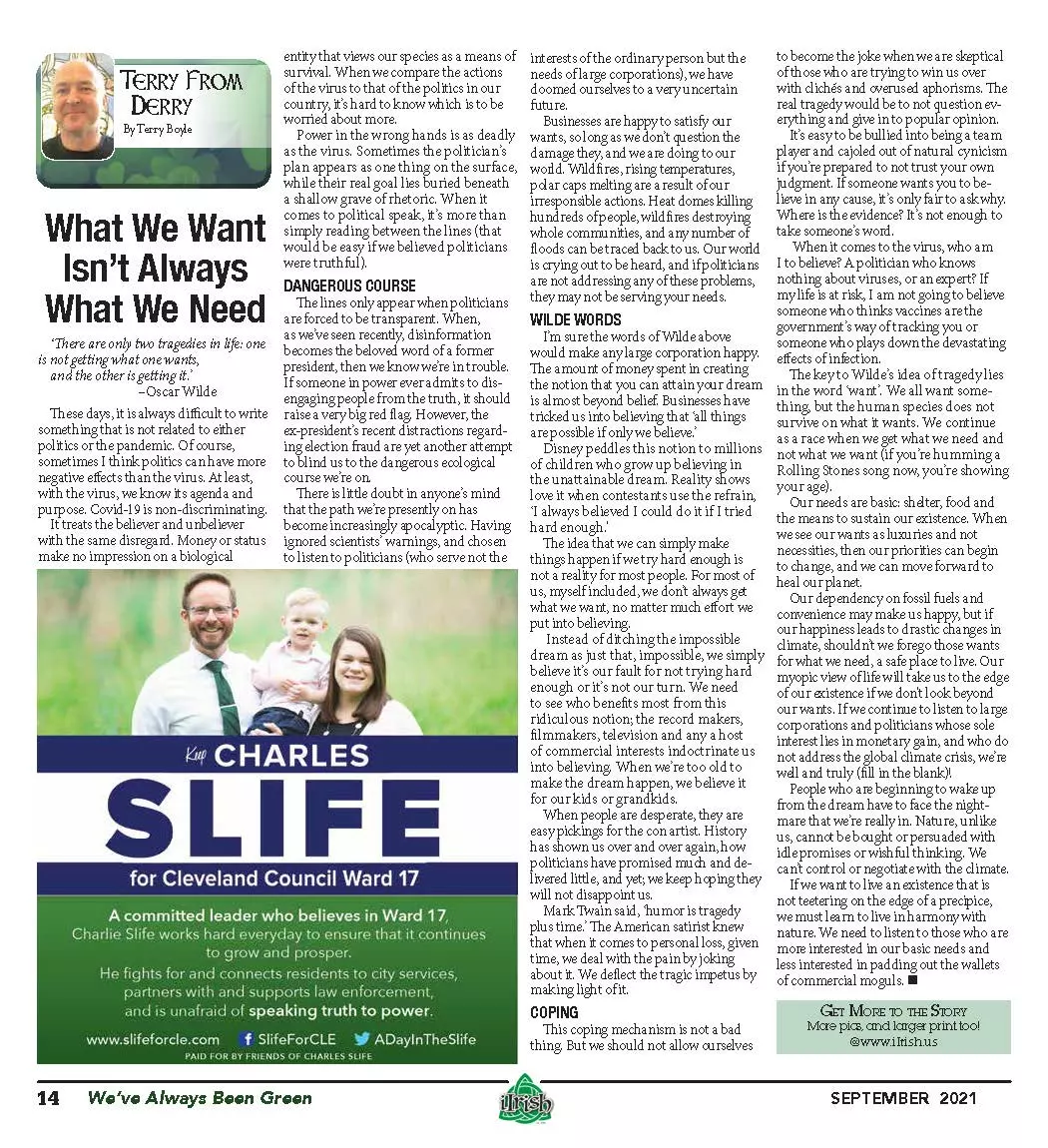Terry from Derry: What We Want Isn’t Always What We Need
- John O'Brien
- September 1, 2021
- Edited 6 months ago
Table of Contents
Terry from Derry: What We Want Isn’t Always What We Need
By Terry Boyle
‘There are only two tragedies in life: one is not getting what one wants,
and the other is getting it.’ – Oscar Wilde
These days, it is always difficult to write something that is not related to either politics or the pandemic. Of course, sometimes I think politics can have more negative effects than the virus. At least, with the virus, we know its agenda and purpose. Covid-19 is non-discriminating.
It treats the believer and unbeliever with the same disregard. Money or status make no impression on a biological entity that views our species as a means of survival. When we compare the actions of the virus to that of the politics in our country, it’s hard to know which is to be worried about more.
Power in the wrong hands is as deadly as the virus. Sometimes the politician’s plan appears as one thing on the surface, while their real goal lies buried beneath a shallow grave of rhetoric. When it comes to political speak, it’s more than simply reading between the lines (that would be easy if we believed politicians were truthful).
Dangerous Course
The lines only appear when politicians are forced to be transparent. When, as we’ve seen recently, disinformation becomes the beloved word of a former president, then we know we’re in trouble. If someone in power ever admits to disengaging people from the truth, it should raise a very big red flag. However, the ex-president’s recent distractions regarding election fraud are yet another attempt to blind us to the dangerous ecological course we’re on.
There is little doubt in anyone’s mind that the path we’re presently on has become increasingly apocalyptic. Having ignored scientists’ warnings, and chosen to listen to politicians (who serve not the interests of the ordinary person but the needs of large corporations), we have doomed ourselves to a very uncertain future.
Businesses are happy to satisfy our wants, so long as we don’t question the damage they, and we are doing to our world. Wildfires, rising temperatures, polar caps melting are a result of our irresponsible actions. Heat domes killing hundreds of people, wildfires destroying whole communities, and any number of floods can be traced back to us. Our world is crying out to be heard, and if politicians are not addressing any of these problems, they may not be serving your needs.
Wilde Words
I’m sure the words of Wilde above would make any large corporation happy. The amount of money spent in creating the notion that you can attain your dream is almost beyond belief. Businesses have tricked us into believing that ‘all things are possible if only we believe.’
Disney peddles this notion to millions of children who grow up believing in the unattainable dream. Reality shows love it when contestants use the refrain, ‘I always believed I could do it if I tried hard enough.’
The idea that we can simply make things happen if we try hard enough is not a reality for most people. For most of us, myself included, we don’t always get what we want, no matter much effort we put into believing.
Instead of ditching the impossible dream as just that, impossible, we simply believe it’s our fault for not trying hard enough or it’s not our turn. We need to see who benefits most from this ridiculous notion; the record makers, filmmakers, television and any a host of commercial interests indoctrinate us into believing. When we’re too old to make the dream happen, we believe it for our kids or grandkids.
When people are desperate, they are easy pickings for the con artist. History has shown us over and over again, how politicians have promised much and delivered little, and yet; we keep hoping they will not disappoint us.
Mark Twain said, ‘humor is tragedy plus time.’ The American satirist knew that when it comes to personal loss, given time, we deal with the pain by joking about it. We deflect the tragic impetus by making light of it.
Coping
This coping mechanism is not a bad thing. But we should not allow ourselves to become the joke when we are skeptical of those who are trying to win us over with clichés and overused aphorisms. The real tragedy would be to not question everything and give in to popular opinion.
It’s easy to be bullied into being a team player and cajoled out of natural cynicism if you’re prepared to not trust your own judgment. If someone wants you to believe in any cause, it’s only fair to ask why. Where is the evidence? It’s not enough to take someone’s word.
When it comes to the virus, who am I to believe? A politician who knows nothing about viruses, or an expert? If my life is at risk, I am not going to believe someone who thinks vaccines are the government’s way of tracking you or someone who plays down the devastating effects of infection.
The key to Wilde’s idea of tragedy lies in the word ‘want’. We all want something, but the human species does not survive on what it wants. We continue as a race when we get what we need and not what we want (if you’re humming a Rolling Stones song now, you’re showing your age).
Our needs are basic: shelter, food and the means to sustain our existence. When we see our wants as luxuries and not necessities, then our priorities can begin to change, and we can move forward to heal our planet.
Our dependency on fossil fuels and convenience may make us happy, but if our happiness leads to drastic changes in climate, shouldn’t we forego those wants for what we need, a safe place to live. Our myopic view of life will take us to the edge of our existence if we don’t look beyond our wants. If we continue to listen to large corporations and politicians whose sole interest lies in monetary gain, and who do not address the global climate crisis, we’re well and truly (fill in the blank)!
People who are beginning to wake up from the dream have to face the nightmare that we’re really in. Nature, unlike us, cannot be bought or persuaded with idle promises or wishful thinking. We can’t control or negotiate with the climate.
If we want to live an existence that is not teetering on the edge of a precipice, we must learn to live in harmony with nature. We need to listen to those who are more interested in our basic needs and less interested in padding out the wallets of commercial moguls.
*Terry is a retired professor now living in Southern California. Terry is originally from Derry, Northern Ireland, and in 2004 he took up a position at Loyola University, Chicago where he taught courses on Irish and British literature. Apart from teaching, Terry has had a number of plays produced and has recently been included in The Best New British and Irish Poets 2019 – 2021 (published by The Black Spring Press). He can be reached at: [email protected]





